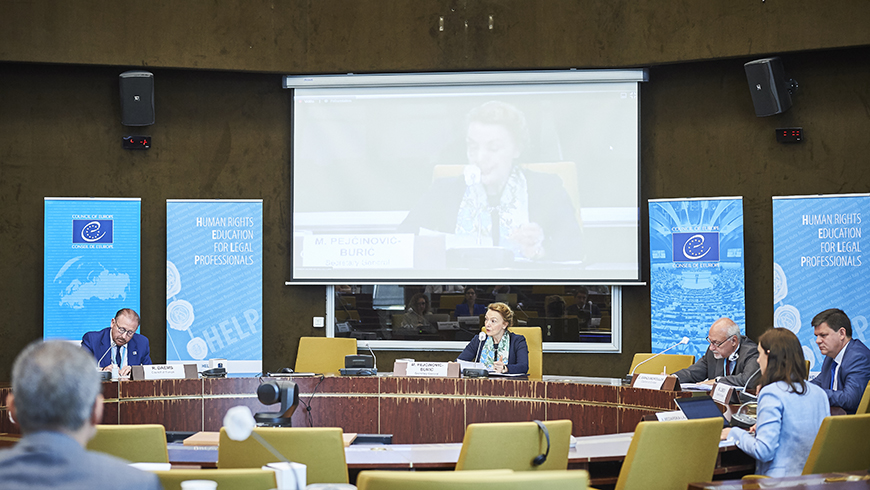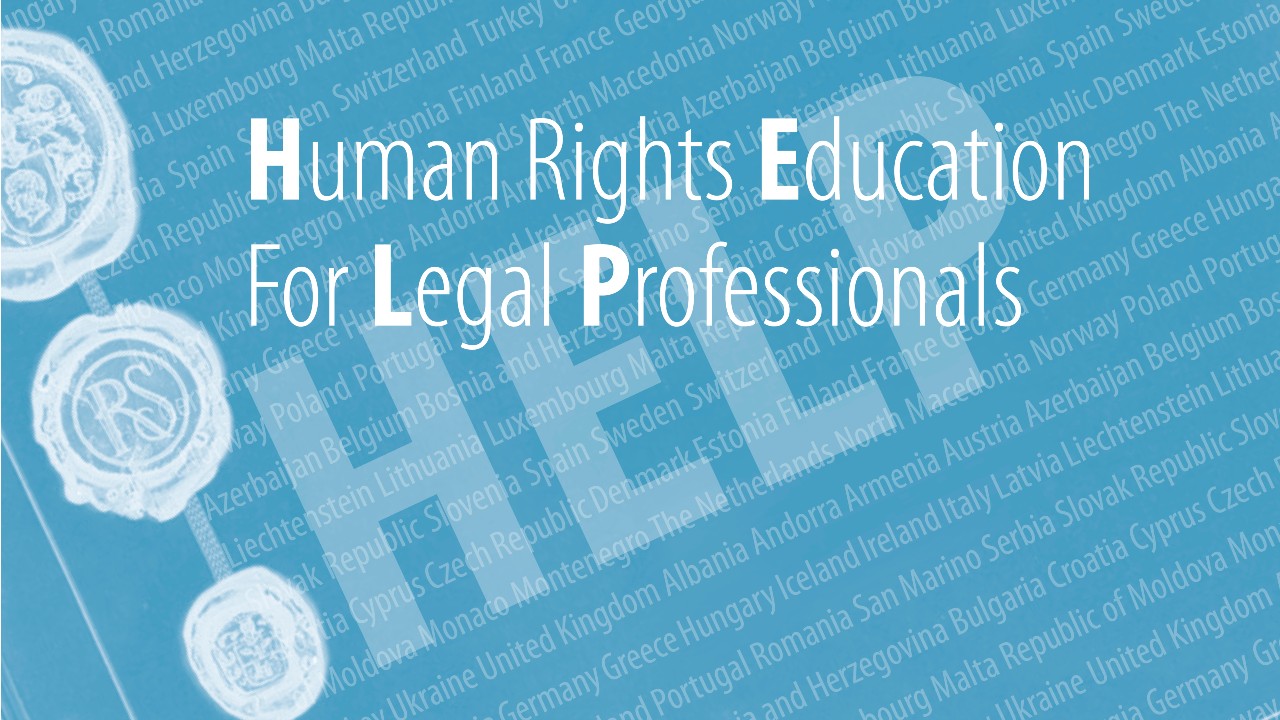On 8-9 July 2019, the Council of Europe Programme for Human Rights Education for Legal Professionals (HELP) held its annual Network Conference. Due to the situation caused by coronavirus pandemic, the Conference was held for the first time in an online format. The Conference was organised under the auspices of the Greek Chairmanship of the Council of Europe’s Committee of Ministers.
Initially aimed at the HELP Network members -national judicial and prosecutorial schools and Bar associations- as well as HELP’s partners such as the European Judicial Training Network (EJTN), the Council of Bar and Law Societies in Europe (CCBE), the EU Agency for Fundamental Rights (FRA), the UNHCR or OSCE/ODIHR, the e-Conference was finally open to a wider audience, streamed with simultaneous interpretation in English, French and Russian.
In her welcoming address, Marija Pejčinović Burić, Secretary General of the Council of Europe, mentioned that the programme trains human rights experts who then apply the Council of Europe’s conventions on the ground, at the national level. “If we want to bring the Convention home, we need effective tools like HELP”, she said.
“It is no coincidence that the most in-demand courses in recent times include those on data protection, violence against women, human trafficking, children’s rights, bioethics and Medicrime. The challenges in these areas have evolved, and sometimes grown, in light of the coronavirus,” Secretary General noted, stressing the role of HELP courses in tackling these problems.
Rik Daems, President of the Parliamentary Assembly of the Council of Europe (PACE), underlined the need of knowledge and expertise of the Council of Europe, so that standards can be transposed to national laws. “Implementation of ECHR is not a legal process, it is also about creating a culture of human rights.”, he said. “HELP is a demand-driven Programme accompanying topical human rights issues, like the new course linking the environment to human rights. While safety is urgent in the current context, environment urgency has also to be felt”. HELP courses, developed for legal professionals, can be particularly useful for Parliamentarians support staff active in legal work.
As noted by Christos Giakoumopoulos, Director General of Human Rights and Rule of Law of the Council of Europe, the European Union is the most relevant institutional partner of the Council of Europe, even more since the re-start of talks on the EU accession to the European Convention on Human Rights. He also underlined how crucial the partnership with the European Union is to amplify the use of HELP courses or even developing new ones such as the course on environment and human rights. Meglena Kuneva, Ambassador, Head of the European Union Delegation to the Council of Europe, stressed the importance of judicial training and how it should also show the interplay between the Convention and EU Charter. She noted that the HELP methodology has proved its value. “HELP is a Programme blessed with enthusiasm and success is a habit that we are already supporting. E-learning of good quality should be available to all European justice professionals. Countries are thirsty to embed Rule of Law in their societies”, she said. The positive synergies between the European Union and the Council of Europe have resulted into quality HELP online courses, sustainable for future needs. Successful examples include cooperation through the projects “HELP in the EU”, “HELP Radicalisation Prevention”, HELP through the “South Mediterranean III” programme in addition to “HELP in the Western Balkans” and the actions to implement HELP courses through the Partnership for Good Governance in the Eastern Partnership countries.
Speaking on the behalf of the Greek Chairmanship with the Committee of Ministers of the Council of Europe, Panayotis Beglitis, Ambassador and Permanent Representative of Greece to the Council of Europe, stressed the links between Greek Chairmanship priorities and the work of the HELP Programme, namely via the HELP courses on Child-friendly Justice and Family Law, Combatting trafficking in human beings, Refugee and Migrant Children and Alternatives to Immigration Detention.
The keynote speech at the Conference was delivered on 9 July by Judge Robert Spano, President of the European Court of Human Rights. “Cooperation activities, such as the HELP Programme, assist in Convention-compliant adjudication at the national level. Domestic judges, prosecutors and legal professionals are on the front-line of relying on, arguing and applying our Convention standards. It becomes self-evident that these professionals need up-to-date, accurate and engaging training materials on the Convention principles and the Court’s case-law. In this sense, the HELP programme is a tool which assists the principle of subsidiarity and shared responsibility of Member States” stressed President Spano, noting that “every European judge is a Strasbourg judge”.
In her video message addressing the Conference in the topical session on Freedom of Expression, Dunja Mijatović, Commissioner for Human Rights of the Council of Europe, warned against the risk to unduly restrict human rights during the sanitary crisis, in particular freedom of expression. “I would like to encourage all of you, especially all legal professionals - lawyers, prosecutors and judges, to use the HELP courses, in particular those related to freedom of expression and the safety of journalists, as a key component of your toolbox to ensure that the democratic fabric of our societies remains firmly grounded on human rights.” said Commissioner Mijatović.
Mikhail Lobov, Head of Human Rights Policy and Cooperation Department, Directorate General Human Rights and Rule of Law of the Council of Europe, stressed again the role of the HELP Programme in increase the capacities of national legal professionals to apply European human rights standards domestically, in line with the principle of subsidiarity under the European Convention on Human Rights. He also emphasised the cooperation of the HELP Programme with the European Court of Human Rights, which is key to the quality of the HELP courses.
The achievements of the HELP Programme and the engagement of the HELP Network members and partners in the past year were presented by Eva Pastrana, Head of HELP Unit, who revealed that the number of users on the HELP online platform had grown to more than 66,000 at the end of June 2020. The catalogue of HELP online courses on various human rights topics grew to 36 courses and more than 250 national adaptation (translations and national law and jurisprudence) freely available on the HELP online platform. HELP courses cover European human rights standards illustrating the interplay between the Council of Europe (ECHR, European Social Charter and other Council of Europe Conventions as well as jurisprudence) and EU (EU Charter and other EU law & jurisprudence the Court of Justice of the European Union).
The HELP achievements under the regional Projects on HELP in the EU and HELP in the Western Balkans, as well as the HELP activities in the Russian Federation, Turkey and Eastern Partnership countries, were also presented to the participants by Ana-Maria Telbis, Valentina Boz, Ana Medarska-Lazova, Imene Khalifa and Natalia Berebenya.
The course on Introduction to the European Convention on Human Rights and European Court of Human Rights was next presented by Maria Andriani Kostopoulou, HELP Info Point and Consultative Board member and Szymon Janczarek, Legal Officer, Department for the Execution of the Judgments of the European Court of Human Rights, Council of Europe. In only 3 months following its publication on the HELP online platform, more than 3 000 users of the HELP online platform were enrolled in this course.
Petros Alikakos, Judge and HELP Focal Point for Greece, representing the Greek National School of Judiciary, spoke about judicial training in critical times, referring to the excellent cooperation with the School of Judiciary with the HELP Programme.
A prominent place in the Conference agenda was dedicated to inform on the current challenges for the respect of certain rights guaranteed with the ECHR and on the HELP response to those challenges through the relevant HELP online courses, putting it in the context of the HELP strategy for the future and placing HELP in the context of other cooperation activities and within the more general Human Rights policy of the Council of Europe:
- HELP course on the MEDICRIME Convention: Oscar Alarcón-Jiménez, Secretary of the Committee of the Parties to the MEDICRIME Convention, Action against Crime Department, Council of Europe
- HELP and Bioethics, Katrin Uerpmann, Deputy Secretary to the Committee on Bioethics, Council of Europe
- The HELP course on Freedom of Expression Martina Silvestri, Manager of the JUFREX Project, Information Society Department, Council of Europe
- Protection and Safety of Journalists: the HELP course: Tarlach Mc Gonagle, course Working Group coordinator, video message, and Elena Dodonova, Administrator, Information Society Department, Council of Europe
- Current challenges for Refugees and Migrants, Kinga Jensen - Magyar, Political advisor, representing the Special Representative of the CoE Secretary General on migration and refugees
- The HELP course on Alternatives to Immigration detention, Eva Pastrana, Head of HELP Unit, Council of Europe
- HELP in the context of cooperation activities: Tigran Karapetyan, Head of Eastern Partnership and Russian Federation Unit, and Daniel Schmidt, Head of South – East Europe and Turkey Unit, Council of Europe
- HELP course on Environment and Human Rights Environment and Human Rights, Natalia Kobylarz, senior lawyer at the Registry of the European Court of Human Rights and Grazia Scocca, author of the HELP module on Environment and Human Rights
- Next steps and strategy for the future: new HELP courses and projects Eva Pastrana, Head of HELP Unit, Council of Europe
On the second day of the Conference, the HELP Network members could address their peers, to present their experiences with HELP courses and to project their plans and ideas for future cooperation:
- Gianluca Grasso, HELP Focal Point for Italy
- Anahit Manasyan, HELP Focal Point for Armenia
- Jelena Ristic, HELP Info Point for North Macedonia
- Raluca Bercea, HELP Info Point for Romania
- Rafael Bustos, HELP Focal Point for Spain
- Sari Piironen, HELP Focal Point for Finland
- Michaela Chladekova, HELP Info Point for Slovakia
- Musa Tanriseven, HELP Focal Point for Turkey
Christophe Poirel, Director of Human Rights, Directorate General Human Rights and Rule of Law of the Council of Europe, stressed three key messages: the transversality of HELP’s work, the flexibility of HELP’s methodology and the need for mutual support between HELP and the national partner institutions: judiciary schools and Bar associations.
At a special session of the Conference, the initiative Open Council of Europe Academic Network (OCEAN) was presented by Prof. Michele Nicoletti, former President of the Parliamentary Assembly of the Council of Europe and coordinator of the ongoing feasibility study.
In the session coordinated by Olaf Köndgen, Senior Project Manager at the Council of Europe, Prof. Chantal Cutajar, University of Strasbourg, and Prof. Tamara Shashikhina, MGIMO University of Moscow, have emphasised the relevance of HELP courses in an academic context and the importance of stronger ties between the Council of Europe and the academic world, particularly in the field of Bioethics Committee’s and GRECO’s activities.
The presentations were followed by a round table with participation of distinguished European scholars from Italy, Germany, and the United Kingdom, highlighting the added value of the OCEAN Project from their perspectives. Ambassadors and members of national delegations to the Council of Europe have put questions and commented on the new initiative.
Speeches
- Marija Pejčinović Burić, Secretary General of the Council of Europe
- Rik Daems, Presence of the Parliamentary Assembly of the Council of Europe
- Panayiotis Beglitis, Ambassador, Permanent Representative of Greece to the Council of Europe (video message)
- Dunja Mijatović, Commissioner for Human Rights, Council of Europe (video message)
- Judge Robert Spano, President of the European Court of Human Rights: transcript and video recording
Documentation and videos from the e-Conference
Watch the recorded video sessions from the e-Conference





